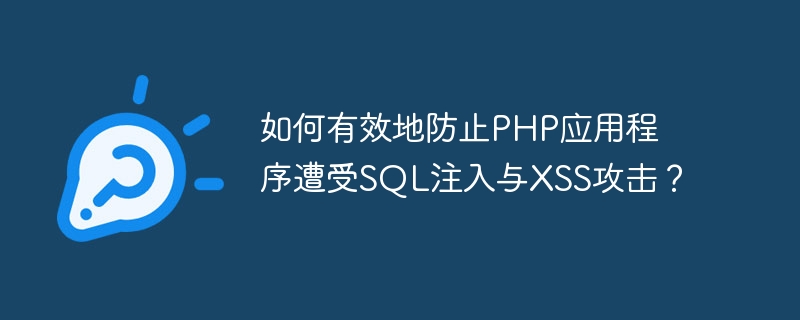Home >Backend Development >PHP Tutorial >How to effectively prevent PHP applications from SQL injection and XSS attacks?
How to effectively prevent PHP applications from SQL injection and XSS attacks?
- PHPzOriginal
- 2023-08-17 17:53:061054browse

How to effectively prevent PHP applications from SQL injection and XSS attacks?
With the rapid development of the Internet, the security of web applications has received more and more attention. Among them, SQL injection and XSS attacks are common security vulnerabilities, bringing serious security risks to Internet applications. To protect the security of user data and the reliability of applications, we need to effectively prevent these attacks. This article will detail how to write secure applications in PHP to avoid the risk of SQL injection and XSS attacks.
- Prevent SQL injection attacks
SQL injection attacks are performed by inserting malicious SQL statements into the user's input, thus bypassing the application's verification mechanism and performing illegal operations on the database. To prevent SQL injection attacks, the following are some effective preventive measures:
- Use prepared statements: Using prepared statements can prevent SQL injection attacks. Prepared statements store user input data separately from SQL statements, and the database will properly escape and process user input to avoid attacks. Here is an example of using prepared statements:
$stmt = $pdo->prepare('SELECT * FROM users WHERE username = :username');
$stmt->execute([':username' => $username]);- Use parameterized queries: Parameterized queries are another way to prevent SQL injection attacks. Parameterized queries treat user-entered data as parameters instead of directly replacing variables in the SQL statement, thus avoiding the risk of injection attacks. Here is an example of using a parameterized query:
$statement = $pdo->prepare('SELECT * FROM users WHERE username = ?');
$statement->bindParam(1, $username);
$statement->execute();- Perform input validation and filtering: Before receiving user input, perform input validation and filtering to identify and reject illegal input. PHP provides some built-in filtering functions, such as
filter_input()andfilter_var(), which can be used to filter user-entered data.
$clean_username = filter_input(INPUT_POST, 'username', FILTER_SANITIZE_STRING);
- Prevent XSS attacks
XSS (cross-site scripting) attacks insert malicious script code into web pages to obtain users' sensitive information or destroy the security of web pages. To prevent XSS attacks, here are some effective preventive measures:
- Escape user input: Before displaying user input on a web page, it needs to be escaped. Special HTML characters are replaced with HTML entities. For example, use the
htmlspecialchars()function to escape:
$clean_text = htmlspecialchars($user_input, ENT_QUOTES, 'UTF-8');
- Set the correct HTTP header: use
Content-Security-PolicyandX-XSS-Protectionand other HTTP headers can further enhance the security of web pages and restrict the loading and execution of external scripts.
header("Content-Security-Policy: script-src 'self'");
header("X-XSS-Protection: 1; mode=block");- Use HTTP-only Cookies: Storing sensitive user information in HTTP-only Cookies can prevent XSS attacks from obtaining this information.
setcookie("session_id", $session_id, time()+3600, "/", "", true, true);To sum up, by using prepared statements, parameterized queries and input validation, SQL injection attacks can be effectively prevented. At the same time, XSS attacks can be effectively prevented by escaping user input, setting correct HTTP headers, and using HTTP-only cookies. When writing PHP applications, it is important to develop good secure coding habits to protect the security of user data.
The above is the detailed content of How to effectively prevent PHP applications from SQL injection and XSS attacks?. For more information, please follow other related articles on the PHP Chinese website!

